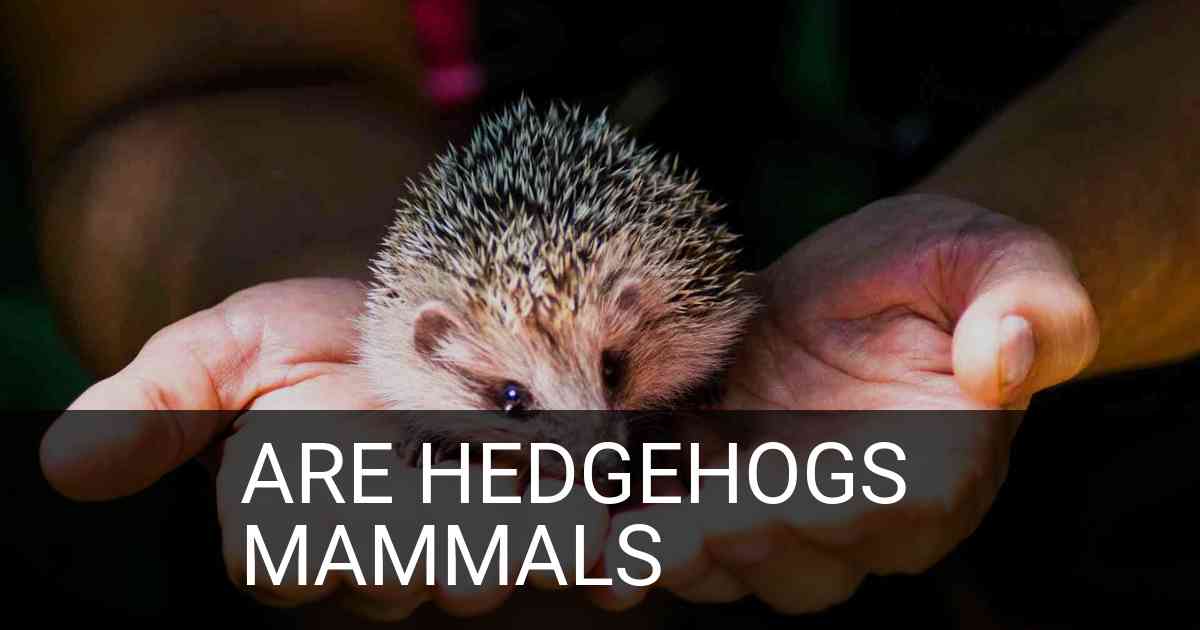
Welcome to our article on “Are Hedgehogs Mammals?” Though they may not be the most common of animals, hedgehogs are truly unique creatures with a fascinating history. From their cute little faces and spikes to their wide variety of colors, hedgehogs have become popular pets around the world. But what many don’t know is that hedgehogs are actually mammals in the taxonomic class of Eulipotyphla. In this article, we’ll explore exactly why hedgehogs are mammals and how they fit into the greater classification system. So read on to learn more about these adorable little critters!
Are Hedgehogs Mammals?
Yes, hedgehogs are mammals. They belong to the taxonomic class of Eulipotyphla and are closely related to moles and shrews. Hedgehogs have many traits that make them mammalian such as:
- Warm-blooded: Hedgehogs maintain a constant body temperature regardless of the outside conditions.
- Fur/Hair: Even though they have spines instead of fur or hair, hedgehogs do in fact have a layer of soft skin beneath their spines.
- Birth Process: Hedgehog babies are born alive after a gestation period of about 30 days.
- Nursing: Mother hedgehogs nurse their young for several weeks until they are old enough to eat solid food.
The Unique Characteristics of the Hedgehog as a Mammal
Hedgehogs are unique and fascinating mammals that can be found in many parts of the world. They belong to the Erinaceidae family, which includes species such as the European hedgehog, African pygmy hedgehog, and long-eared hedgehog.
Physical Appearance
Hedgehogs have short legs and strong shoulders with sharp spines on their back. The spines are made of keratin and come in various colors, ranging from light brown to black or white. They have small eyes and ears covered by fur but no visible tail.
Behavior
Hedgehogs are solitary animals who generally only interact with other members of their species for mating purposes. During cold winter months they hibernate, during which time their body temperature decreases significantly. During this period they feed mainly on insects and plants.
Adaptability
- They are able to survive in a wide variety of habitats including woodlands, grasslands, deserts, savannahs, mountains, scrubland etc.
- They can also adapt to urban areas if there is sufficient food available.
- Their digging behavior helps them create burrows providing safety from predators.
The Secret Behind Hedgehog Reproduction: Do They Lay Eggs?
Hedgehogs are small, spiny mammals found in Europe, Africa, and Asia. These curious animals have been popular pets for many years due to their cute appearance and docile nature. But, one question that often comes up when discussing hedgehogs is whether or not they lay eggs.
The answer to this question is both yes and no. Hedgehogs do reproduce by laying eggs, but these eggs do not hatch into baby hedgehogs. Instead, the female hedgehog gives birth to live young after a gestation period of about 35 days.
How Do Hedgehog Eggs Work?
Although hedgehog eggs don’t hatch into baby hedgehogs, they still play an important role in reproduction. When a male and female hedgehog mate, the female’s body produces several small yolk-filled eggs which are then stored inside her uterus until they are ready to be fertilized.
Once the male’s sperm penetrates the egg’s shell, it triggers a process known as parthenogenesis (or “virgin birth”). This causes the egg to begin developing without any additional genetic material from another organism – essentially creating an embryo with only half of its normal genetic information.
What Is The Purpose Of Hedgehog Eggs?
Hedgehog eggs serve two main purposes during reproduction. First of all, they provide nourishment for the developing fetus while it is still in its mother’s womb. Secondly, they act as a protective barrier between the outside environment and the growing fetus.
- Nourishment: Eggs contain nutrients such as proteins and fats which can help sustain fetal growth throughout pregnancy.
- Protection: The hard outer shell of each egg protects against bacteria and other disease-causing organisms that may try to enter through cracks or gaps in the uterus wall.
In addition to providing nourishment and protection for fetuses during development, some scientists believe that hedgehog eggs may also play a role in helping females determine if potential mates are genetically compatible with them.
The Classification of Hedgehogs
Hedgehogs are small mammals with spines on their backs. They belong to the family Erinaceidae and there are sixteen species of hedgehog in five genera found throughout parts of Europe, Asia, Africa and New Zealand.
Classification
Hedgehogs belong to the order Eulipotyphla which includes animals such as moles, shrews and solenodons. Within this order, they are placed within the suborder Erinaceomorpha, along with gymnures and moonrats. The hedgehog family is divided into five genera: Atelerix, Erinaceus (European hedgehog), Hemiechinus (long-eared hedgehog), Mesechinus (Daurian or Mongolian hedgehog) and Paraechinus (desert hedgehog). These five genera contain a total of 16 species.
Species
- Atelerix albiventris: Four-toed Hedgehog
- Atelerix frontalis: Somali Hedgehog
- Erinaceus concolor: Southern White-breasted Hedgehog
- Erinaceus europaeus: European Hedgehog
- Erinaceus roumanicus: Romanian Long-eared Hedgehog
- Hemiechinus auritus: Long-eared Hedgehog
- Hemiechinus collaris: Indian Long-eared Hedgehog/ Afghan Hedgehog/ Northern White-breasted Hedgehog/ Dusky Hedgehog/ Collared Hedgehog/ Splendid Hedgehog.
Conclusion
In conclusion, the answer to the question “Are Hedgehogs Mammals?” is a resounding yes! Hedgehogs are mammals that belong to the order Insectivora and have several unique characteristics that make them stand out from other small mammals. They possess fur-covered bodies, give birth to live young, produce milk for their offspring, and maintain a body temperature higher than the ambient air. All of these traits make hedgehogs true members of the mammalian class!

